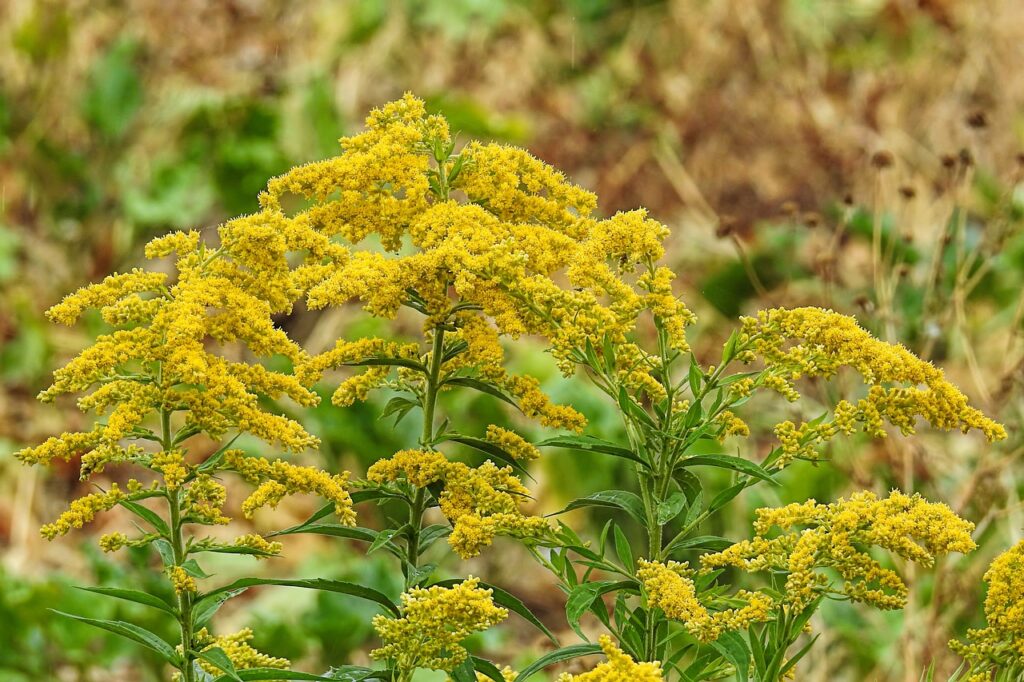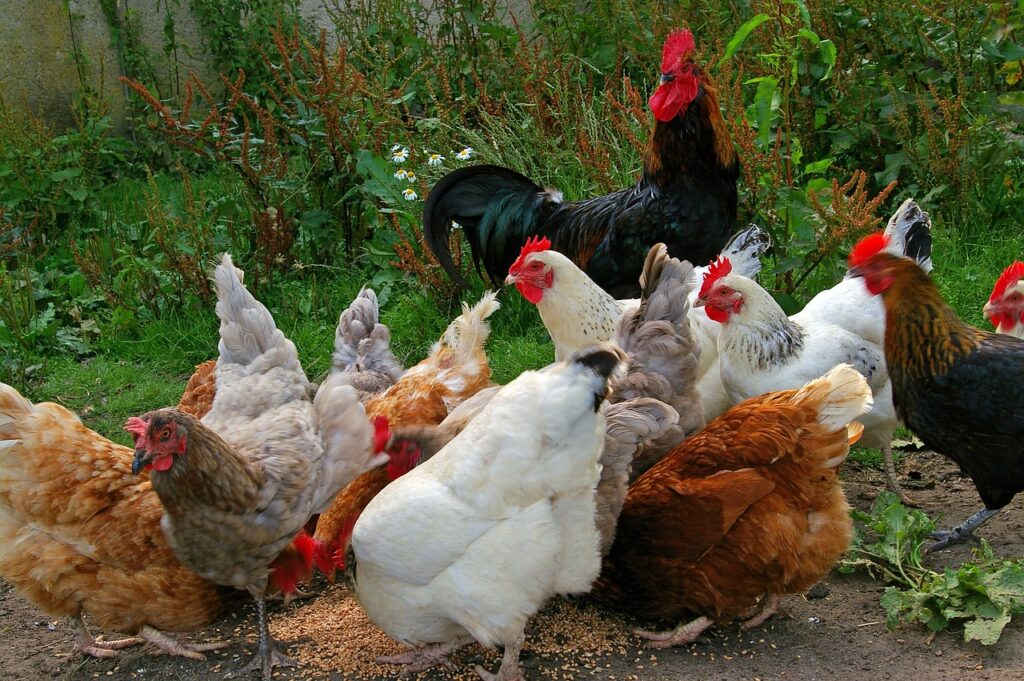Ever noticed your chickens pecking curiously at the bright yellow stalks of goldenrod growing near their coop? You might wonder if this wildflower is safe for them to munch on. The answer is yes, chickens can absolutely eat goldenrod! Not only is it non-toxic, but it can also offer some surprising health benefits.
This guide will explore everything you need to know about feeding goldenrod to your feathered flock. We’ll discuss the nutritional value of this plant, potential feeding concerns, and answer all your questions about incorporating goldenrod into a healthy chicken diet.
The Benefits Of Eating Goldenrod
Goldenrod isn’t just a pretty face in the wildflower world. Here’s how it can benefit your chickens:
- Natural Dewormer: Goldenrod contains a compound called saponin, which has natural de-worming properties. It can help to keep your chickens free from internal parasites, promoting overall health and flock well-being.
- Nutrient Boost: Goldenrod is a good source of vitamins A and C, both essential for healthy chickens. Vitamin A supports strong eyesight and immune function, while Vitamin C aids in wound healing and stress reduction.
- Digestive Aid: The high fiber content in goldenrod leaves can aid digestion in your chickens. Fiber helps move food through the digestive tract efficiently, preventing constipation and promoting gut health.
- Immune System Support: Goldenrod’s antioxidants help to fight free radicals in your chickens’ bodies, boosting their immune system and making them more resistant to illnesses.
- Increased Foraging Behavior: Goldenrod adds variety to your chickens’ diet, encouraging them to engage in their natural foraging instincts. This keeps them active and mentally stimulated.

Things To Watch Out For When Feeding Goldenrod
While goldenrod is generally safe for chickens, there are a few things to keep in mind:
- In Moderation: Goldenrod contains a small amount of tannins, which can be astringent and potentially interfere with nutrient absorption in large quantities. Offer it as a treat, not a staple food.
- Variety is Key: Like any food, too much goldenrod can become unbalanced in a chicken’s diet. Provide a mix of fresh greens, vegetables, fruits, and commercially prepared chicken feed for a well-rounded menu.
- Identification Matters: There are a few goldenrod lookalikes that can be toxic to chickens. If you’re unsure of the specific goldenrod variety, it’s best to err on the side of caution and avoid offering it.
- Pesticide Concerns: Avoid giving your chickens goldenrod that’s been treated with pesticides or herbicides. These chemicals can be harmful to your flock.
- Moldy or Spoiled Plants: Just like humans, chickens shouldn’t eat moldy or rotten food. Inspect the goldenrod before offering it to ensure it’s fresh and healthy.
How Often Should You Feed Your Chickens Goldenrod?
Goldenrod is best offered as an occasional treat, not a daily dietary staple. A handful of goldenrod leaves and flowers, two or three times a week, is sufficient for a healthy adult chicken. Observe your chickens’ behavior after introducing goldenrod. If you notice any digestive upset or changes in their droppings, discontinue feeding it.
How To Prepare Goldenrod When Feeding Your Chicken
Goldenrod preparation for your chickens is simple! Here’s what you need to do:
- Gather Fresh Goldenrod: Locate a healthy patch of goldenrod away from roads or areas where pesticides might be used. Choose young, tender leaves and flowers.
- Give it a Rinse: Wash the goldenrod gently under running water to remove any dirt, insects, or debris.
- Chop it Up (Optional): For larger breeds of chickens, chopping the goldenrod into smaller pieces can make it easier for them to eat.
- Offer it Fresh: Provide the goldenrod to your chickens directly or scatter it around their coop to encourage natural foraging behavior.
Can Baby Chicks Eat Goldenrod?
Goldenrod is generally not recommended for chicks under 6 weeks old. Their digestive systems are still developing, and goldenrod’s tannins might be too harsh. It’s best to stick to a commercially prepared chick starter feed for the first few weeks of their lives.
What Other Foods Can Chickens Eat?
Chickens are omnivores, meaning they enjoy a variety of foods. Here are some safe and healthy options to complement their goldenrod treats:
- Fresh Vegetables and Greens: Kale, romaine lettuce, swiss chard, carrots, beets, zucchini, and cucumbers are all great choices.
- Fruits: Chickens love berries, apples, pears, and melons (offered in moderation due to the sugar content).
- Herbs: Fresh herbs like basil, oregano, mint, and thyme add variety and offer some health benefits.
- Kitchen Scraps: Eggshells (crushed to avoid them swallowing whole eggs), leftover cooked vegetables (not greasy or spoiled), and plain bread (torn into small pieces) can be offered occasionally.
- Commercial Chicken Feed: This should be the foundation of your chickens’ diet. Choose a high-quality, balanced feed formulated for their specific age and needs.

How To Give Your Chickens A Healthy And Balanced Diet
Providing your chickens with a balanced diet is key to their overall health and happiness. Here are some tips:
- Variety is Key: Offer your chickens a diverse selection of foods from the categories mentioned above. This ensures they get all the essential nutrients they need to thrive.
- Freshness Matters: Always provide your chickens with fresh, clean food and water. Remove uneaten food scraps after a day to prevent spoilage and attract pests.
- Portion Control: Don’t overfeed your chickens. Overeating can lead to obesity, lethargy, and egg-laying problems. Observe their eating habits and adjust portion sizes accordingly.
- Age-Appropriate Feeding: Chicks, adult chickens, and laying hens have different nutritional needs. Choose a feed and supplements specifically formulated for their age group.
- Treats in Moderation: While goldenrod and other treats can be beneficial, remember they shouldn’t replace their main diet of commercial feed.
Additional Notes:
If you’re unsure about any specific plant or food item, it’s always best to consult with a veterinarian or a poultry specialist before feeding it to your chickens.
Observe your chickens closely after introducing any new food. If you notice any signs of illness, stop feeding it immediately and consult a vet.
Remember, happy chickens are healthy chickens! Provide them with a clean coop, plenty of fresh water, space to roam, and a stimulating environment along with a balanced diet for optimal well-being.
Final Verdict
Goldenrod can be a safe and healthy addition to your chickens’ diet. It offers a variety of benefits, from natural parasite control to immune system support. However, remember to introduce it gradually, offer it in moderation, and prioritize a balanced diet with commercially prepared feed and other fresh options. By following these guidelines, you can ensure your feathered friends enjoy the occasional golden treat while staying happy and healthy!

